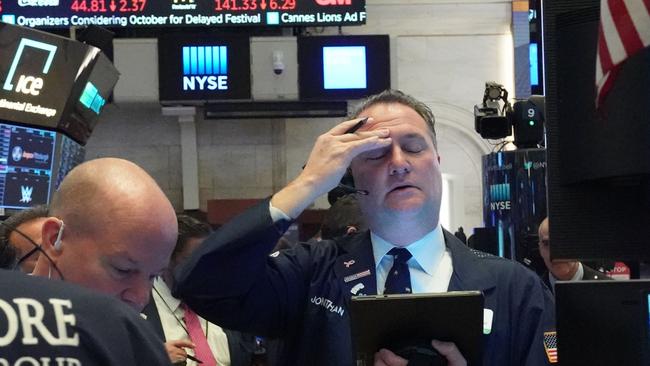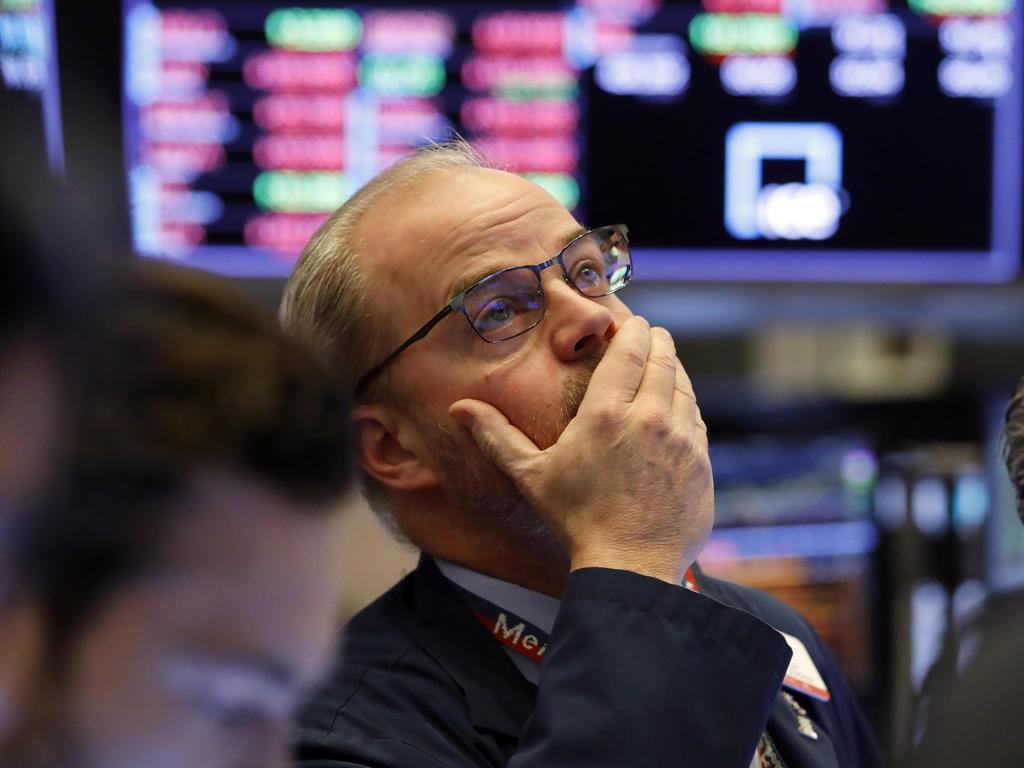Coronavirus crisis: where cash is all that matters
A rush for cash has shaken the US financial system, taking the market turmoil into a new, more troubling liquidation phase.

A rush for cash shook the US financial system as companies and investors hunkered down for a prolonged economic stall, taking the recent market turmoil into a new, more troubling liquidation phase.
Investors sold nearly everything they could in the most all-encompassing market drawdown since the darkest days of the 2008 financial crisis. Short-term money markets at the heart of the financial system were strained and large companies have drawn heavily on credit facilities while they have them.
The selling engulfed stocks, sending the Dow Jones Industrial Average down nearly 9 per cent to its first close below 20000 in more than three years. The blue-chip index has fallen by about a third in just the past month.
LIVE BLOG: Follow all the market reaction
The rout crushed shares of companies as varied as airlines, restaurants, banks and retailers. The carnage showed the extent to which investors are worried that the coronavirus pandemic -- which has already forced airlines to cut flights and businesses to close -- could send the economy into a recession.
Shares of Boeing tumbled 26pc, while stock in Citigroup lost nearly 20 per cent in value. A drop of more than 20 per cent in the price of oil slammed shares of energy companies. Exxon Mobil fell around 12 per cent and has halved so far this year.
Several stocks fell so sharply that exchanges had to temporarily halt trading in them. One such stock, Alaska Air Group, tumbled 38 per cent. Olive Garden owner Darden Restaurants slid 35 per cent. Coty, whose beauty portfolio includes Sally Hansen, dropped 34 per cent.
In debt markets, the sell-everything approach drove down prices of safe investment grade bonds and government debt alongside stocks and commodities of nearly all stripes. Normally, when investors turn away from risky assets, they buy safer government debt -- or if they are really frightened, gold. Investors appear to be putting their trust in only the shortest-term government bonds or cash.
“If you think about it from a small business standpoint, a big business standpoint, a fund manager standpoint. Liquidity and cash is going to be king,” said John Briggs, head of strategy, Americas, at NatWest Markets. “Take Italy: They’ve just hard-stopped the eighth largest economy in the world. We’ve never seen anything like this.”
Yields on one-month US Treasury bills, a close equivalent to cash, fell to as low as 0.01 per cent from 0.31 per cent at the start of the week, their lowest level in several years.
“There are very few places to hide. The tightening in financial conditions is happening across markets,” said Nikolaos Panigirtzoglou, global markets strategist at JPMorgan Chase & Co. He pointed to strong selling of bond funds that own the debt of the safest big companies, which is causing corporate borrowing costs to rise despite central bank efforts to do the opposite.
Another factor pushing government bond yields higher: as investors dash for safety, they are contending with a potential massive new supply of government bonds that will be necessary to fund stimulus measures, including $US1 trillion of spending discussed in Washington.
In the simplest terms, a greater supply of bonds should cause prices to fall, and yields to rise.
The rush to cash, meanwhile, has put strain on money markets in the US and globally. The difference between the yield on the three-month Treasury bill and interbank lending rates, known as the Ted spread, jumped above 1 percentage point, according to FactSet, a level not seen since early 2009. In good times, the difference between the rates, which reflects how easy it is for banks to get hold of short-term borrowing, is negligible.
The US dollar, meanwhile, has surged against all currencies as the cost to borrow dollars has risen substantially.
People and companies need cash to cover rent, bills and other fixed costs at a time when businesses and schools are shutting doors and sending staff home across the US and Europe to halt the spread of the coronavirus.
This has led a wave of companies including Boeing, Hilton Worldwide Holdings, Kraft-Heinz and Anheuser-Busch InBev, to draw down billions of dollars from credit facilities. The Federal Reserve has had to step in and support the smooth functioning of the commercial paper market, where companies can borrow short-term because huge demand there has met diminishing supply from money-market funds and others who are preparing to face their own cash withdrawals, according to analysts.
The Bank of England said it would provide an unlimited amount of financing in commercial paper markets.
Small and medium-size companies in the US and Europe are likely to be among the hardest hit because they have less room for error. Eric Lonergan, a portfolio manager at M&G Investments, said smaller companies in the UK were already delaying payments to their creditors if they could.
“I think the entire economic system is trying to conserve cash at the moment,” he said.
Sushil Wadhwani, chief investment officer of QMA Wadhwani, a UK-based hedge fund, said the rational thing for individual companies was to access credit lines. Pension funds, meanwhile, which are normally built to ride out long market disruptions, may also be joining the cash dash.
“For pension funds, it is sell anything you can sell to build up reserves so you can tell your trustees that you have enough cash to pay pensions over the next nine or 10 months,” he said.
Feeding the panic is the difficulty in knowing how long the economy will be paralysed and what the long-term damage will be. Mr Wadhwani said there were two big unknowns: how long the coronavirus will take to reach a peak number of infections, and what government responses will ultimately be.
“The longer this goes on, the more bankruptcy you get and the more unemployment you get,” he said.
Wall Street Journal





To join the conversation, please log in. Don't have an account? Register
Join the conversation, you are commenting as Logout